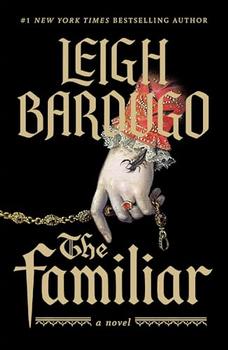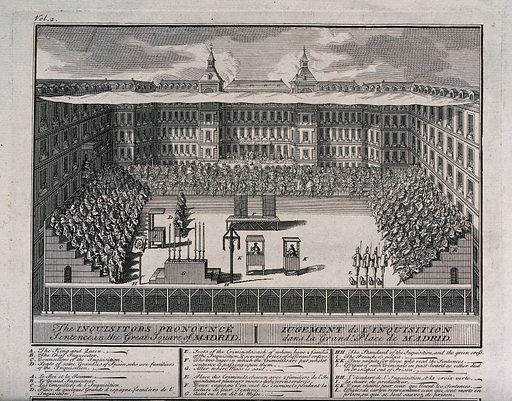Summary | Excerpt | Reading Guide | Discuss | Reviews | Beyond the Book | Read-Alikes | Genres & Themes | Author Bio

A Novel
by Leigh BardugoThis article relates to The Familiar
 The fictional heroine of Leigh Bardugo's novel The Familiar interacts with several characters based on people who really did live in Spain during the 16th century. One of these is a young woman based on the figure Lucrecia de León, also known as "Lucrecia the Dreamer." Like the main character Luzia, Lucrecia comes under government suspicion for having certain abilities that are not easily explained, a detail that is consistent with the facts of De León's life.
The fictional heroine of Leigh Bardugo's novel The Familiar interacts with several characters based on people who really did live in Spain during the 16th century. One of these is a young woman based on the figure Lucrecia de León, also known as "Lucrecia the Dreamer." Like the main character Luzia, Lucrecia comes under government suspicion for having certain abilities that are not easily explained, a detail that is consistent with the facts of De León's life.
Spain's ruler, Philip II, moved his court and imperial residence to Madrid in 1561, and by the end of the decade the city had become a hotbed of political intrigue. Conspiracies and rumors ran rampant and talk against the king was common. Many felt the monarchy had become corrupt and greedy, working for the benefit of the wealthy rather than its subjects. Prophecies were used as a tool to both validate the king's rule and to protest his policies.
Lucrecia de León was born into this environment in 1567 or 1568, the daughter of a solicitor of modest means who received little education. She had vivid dreams from an early age and could relate them in stunning detail. When some of the dreams came true, people started asking her to divulge her visions to them. She began charging a fee for the information, against her father's wishes.
As Lucrecia grew into adulthood, news of her talents reached the ears of a powerful clergyman, Alonso de Mendoza. Mendoza was obsessed with prophecies and arranged to have Lucrecia's dreams recorded regularly. Ultimately these "Dream Registers," compiled from November 1587 through April 1590, would contain over 400 entries.
Lucrecia ran afoul of the government in February 1588, when her dreams predicted the defeat of Spain's Armada, and the deaths of Philip and his son and heir. Her arrest was ordered by the vicar of Madrid. Mendoza appealed to the papal nuncio and the inquisitor general, asking for time to determine if Lucrecia's dreams were a gift from God. He prevailed and she was released, and the following August the Spanish Armada was, indeed, crushed as she had predicted. She consequently became even more popular.
During this same time, the king's secretary, Antonio Pérez, fell from favor. Once Philip's confidant, Pérez manipulated and deceived him; when this betrayal was discovered, Pérez was arrested. He escaped from prison in April 1590, with the help of a supporter who also championed Lucrecia, and she came under suspicion of plotting against the monarchy and supporting Pérez as a result.
She was questioned — sometimes under torture — for the next five years. She may have been held for so long because some of her visions had come true, and so some wondered if she was divinely inspired. The court finally issued a verdict in July 1595, convicting her of blasphemy, witchcraft and sedition, among other things. Her auto-da-fé — a public ritual of penance — was held five days later. She was sentenced to 100 lashes and imprisonment for two years, followed by permanent expulsion from Madrid. This was actually a light sentence, as many accused of such serious crimes were burned at the stake. There's no documentation as to why she was shown such leniency, although the authorities may have concluded she was just an ignorant girl who was used by unscrupulous enemies of the crown.
Lucrecia's ultimate fate remains unknown; she disappears from the historical record at this point.
An auto-da-fé in the Great Square in Madrid
Illustration courtesy of Wellcome Collection via Look and Learn (CC BY 4.0)
Filed under People, Eras & Events
![]() This "beyond the book article" relates to The Familiar. It originally ran in April 2024 and has been updated for the
March 2025 paperback edition.
Go to magazine.
This "beyond the book article" relates to The Familiar. It originally ran in April 2024 and has been updated for the
March 2025 paperback edition.
Go to magazine.
They say that in the end truth will triumph, but it's a lie.
Click Here to find out who said this, as well as discovering other famous literary quotes!
Your guide toexceptional books
BookBrowse seeks out and recommends the best in contemporary fiction and nonfiction—books that not only engage and entertain but also deepen our understanding of ourselves and the world around us.